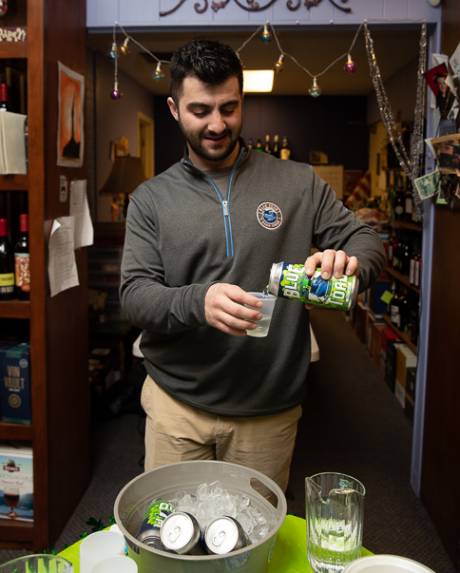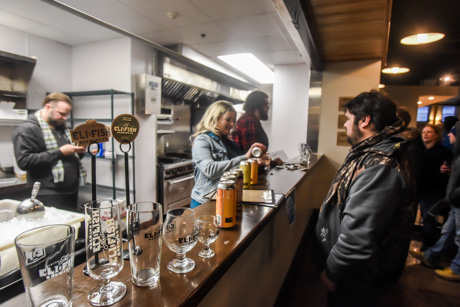Not satisfied with the latest water rate study conducted by a New York City consulting firm, Genesee County government leaders will be putting their heads together in the coming weeks to find a path to a unified water rate for customers in the county’s two retail areas and lone wholesale area.
Tim Hens, county water system coordinator (as well as highway superintendent and engineer), updated the Genesee County Legislature’s Public Service Committee last week about the topic, which was prompted by a request by several towns in the Western Genesee MCWA Retail Area to look into the possibility of one rate for all.
The MCWA, or Monroe County Water Authority, provides water to most of the county, and determines the rates that users pay. Genesee County is divided into three zones: the East and West Retail Areas and the Central Wholesale Area. Currently, the rates are different in the three areas, with the West paying more than the other two, Hens said.
The West is comprised of the Town of Pembroke, Town of Darien and Village of Corfu.
The East side is comprised of Byron, Bergen, Le Roy, Stafford and Pavilion and the associated villages in those areas.
And the Central (or northwest) is comprised of the towns of Alabama, Oakfield, Elba, Batavia, Alexander, the villages in those towns, and the City of Batavia.
“Both East and West are retail because the Monroe County Water Authority operates the system,” Hens said. “They do the maintenance and they do the billing. MCWA leases the lines from the towns, operate it on their behalf, and establish the rates.”
MCWA IS THE ‘ULTIMATE AUTHORITY’
Hens said the MCWA, as a public authority, is required to have a third-party consultant come in and look at the total operation costs – pump stations, water treatment plants, water towers, annual maintenance, billing and all the overhead that goes into operating the system – prior to releasing a report.
“But the ultimate authority establishing the rate resides with the MCWA board,” he emphasized.
Concerning the Central Wholesale Area, Hens said those towns and villages are “technically buying water from Genesee County.”
“We purchase water on a wholesale basis from Monroe County at the Seven Springs connections in the Town of Stafford and that water is blended with water produced in the City of Batavia water plant, and then sent out to those areas,” he explained. “Most of the wholesale areas are operated by the Town of Batavia as it has intermunicipal agreements with each of those towns, except for the Village and Town of Oakfield and the City of Batavia, which operate their own systems.”
Hens said that each town still has jurisdiction over its market locally, but buys water from the county at wholesale versus buying it directly from the MCWA.
“The individual rate that each town charges is based on a rate that Genesee County charges them for water, which we use basically a 50-50 blend between the Monroe County wholesale and the City of Batavia rate from the water plant,” he advised. “Those two rates right now are about 10 to 15 cents apart so averaging them together, there isn’t that big of a difference.”
BUYING WATER AT WHOLESALE RATE
He said the county charges the wholesale rate (around $2.43 per 1,000 gallons) to the Central municipalities and, in turn, they mark that up to cover their overhead, capital reserve and/or debt service, and charge the customers just as the MCWA does. Those fees increase the total rate to around $6 per 1,000 gallons, which is within 30 cents per 1,000 gallons of the MCWA retail rate after factoring in all charges.
“At the end of the day, the total rate charged to customers in the Center part of the county, with the exception of the Village of Oakfield, is very comparable to what East residents are paying and not too much different from what the West residents are paying,” Hens said. “Oakfield is a bit higher due to their debt service.”
Customers residing in the Western Genesee Retail Area pay more due to several factors, Hens said.
“What makes the West side unique is that it is a small geographic area with less customers and they also have the operation of the Corfu water plant to factor in. Monroe County uses that plant to essentially treat and disinfect byproducts coming from Erie County because we’re kind of at the end of the system,” he said. “Another factor is the cost of operating the pump station in Pembroke. That area is 60 to 80 miles from the home base in Monroe County.”
Furthermore, much more water is coming in to the East side – a larger area with more customers and just one operational expense: the North Road pump station.
“That results in the difference in retail rates with the West side, obviously, being more expensive,” Hens said/ “The West side water is also expensive due to the higher cost of water in Erie County which MCWA must buy and then markup to cover their costs.”
DISCREPANCY IS PART OF PUBLIC DISCOURSE
Hens said the price difference between the East and West came to light a few years ago during negotiations over sales tax agreements and water rates with the towns and villages.
“At the time it was about a 90-cent difference between the East and West, with the West being more expensive – and we received a lot of feedback from municipalities on the West side of the county (stating) that there was a perception of unfairness in the rate,” he said.
As a result, the county was asked to investigate – in consultation with the MCWA -- and try to come up with a uniform rate throughout the county.
“We did that about a year ago as the legislature passed a resolution asking the Water Authority to study the feasibility of a unified county rate so that East and West would basically pay the same,” Hens said. “The thought was that because of the water usage difference between the East and the West, a unified rate would be halfway between or skewed toward the East because it is using about twice the amount of water that the West does.”
Hens said county officials were eager to see the rate study, hoping that it would lead to opportunities to move Erie County water through the West side of the system -- potentially to Alabama, Oakfield or Elba if those towns were to migrate to a retail situation with Monroe County.
BILLED VS. MASTER METERED WATER
“So, we got the study back, and the rates are a little bit higher than what I anticipated,” he said. “The biggest factor in the difference from what I projected and what the consultant (Amawalk Consulting Group of New York City) came up with was they used billed water and I used master metered water. The master metered water includes lost water and hydraulic bleeds to other systems where the billed water is only what is used by customers. This skews the ratio in water between East and West.”
The consultant’s findings for 2020 projected a combined, unified rate of $4.21 per 1,000 gallons, while Hens’ came up with $3.99 per 1,000 gallons. He said the $4.21 price is an increase of 47 cents per 1,000 gallons for East customers and a savings of about 80 cents per 1,000 gallons for West customers.
Since the average house uses about 60,000 gallons of water per year, a 47-cent increase on billed water to an East customer would equate to about $30 per year.
Hens said if you project that out over the next five years, the rate in the West expands “quite quickly,” with the gap increasing to almost $2 per 1,000 gallons versus the $1.30 gap that exists now.
“One of the things that the study didn’t consider – which I’m a little disappointed in – is that we’re seeing substantial growth in water usage on the East side, especially in the next two or three years,” he said.
PROPOSED DISTRICTS TO INCREASE USAGE
Amawalk apparently didn’t “read the tea leaves” on future usage, Hens said, noting that large water districts proposed for Byron, Bergen and the Town of Bethany will use about a combined 500,000 gallons of water per day on average.
“If that usage was factored in, then the unified rate would skew more heavily toward the East rate -- and the savings in the West would be more and the impact upon the users on the East would be even less,” he said.
Hens said the study also did not consider the Center (wholesale) portion of the county, which has seen a predominant increase in water usage.
“There are several moving pieces on the Countywide Water System that either impact the rate study dramatically or the rate conversely impacts on the Phase 2 and Phase 3 projects,” he said.
Hens’ presentation drew reaction from county legislators and town officials.
Legislature Gordon Dibble, who represents Darien and Pembroke, bemoaned the fact that customers pay more in those areas, and said he hoped the study could be amended.
Water to Darien, Pembroke and Corfu comes from Erie County and already is more expensive. Hens said that the Erie County base rate for water is the “real culprit” for the difference in price.
40-YEAR AGREEMENT IN FORCE, BUT …
Legislature Chair Rochelle Stein concurred, noting that the West is facing an 11-percent increase for 2021 compared to a 4.4-percent increase in the East. Again, Hens said, factors include the Erie County base rate, operational costs at the Corfu water plant and the number of gallons of water used.
Stein also pointed out that the towns agreed to the terms when they signed a 40-year water agreement as part of Phase 1.
Darien Town Supervisor Steve Ferry Jr. responded by saying he understood but brought up that the county indicated that a transmission line between Alexander and Darien was supposed to be put in but it never happened.
He, too, urged legislators to look at the entire system “and come up with a way to make it fairer for everyone.”
Going forward, Hens said a detailed discussion is on the agenda for the April 13th meeting of the Genesee County Water Resources Agency. The GCWRA was created in 1998 from the legislature’s Water Supply Task Force to assist in the implementation of water improvements for the county.
Earl LaGrou, of Alabama, GCWRA chair, said the report is essential to the future and longevity of the county water system.
FINANCIAL STABILITY IS THE KEY
“That’s what they’re trying to secure – the type of funding that is needed … to continue on with our latest phase, to help pay for that, but also water systems are not a five- or 10-year entity, they’re 30, 40, 50 years and they want to make sure there is enough cash flow to have upgrades,” he offered.
“We’re in Western New York. If there’s an emergency ice or weather-related incident where a pipe freezes, they have to have money to repair that so people aren’t without water. That’s what they’re trying to do – just get an across-the-board, easier rate that helps solidify the financial stability of the water system.”
LaGrou said GCWRA board members just received the report from Hens and will review it before making a recommendation to the Genesee County Legislature.
“Our board kind of does all the homework and we make recommendations – we don’t set forth policy,” he said. “Between now and April 13th, I’m sure that Tim will bring to us the pros and cons of the recommendation for the water rates ... so we can make an educated decision before the April 13th meeting. There may be some calls back and forth.”
That 10-member committee also includes Stein and legislators Gary Maha and Christian Yunker.




